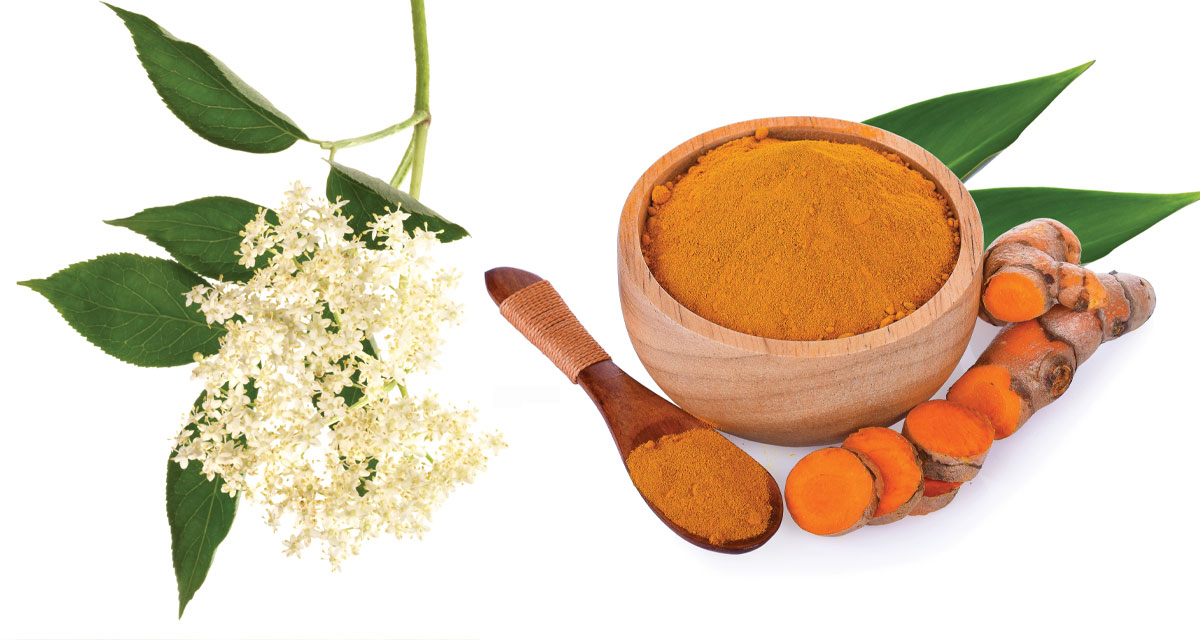From lemon elderflower-infused wedding cakes for the royals to turmeric lattes to warm your hearts, elderflower and turmeric are bound to keep things pretty unique and tasty this winter season.
What is elderflower? Elderflower is typically an extract naturally derived from white elderflowers grown on elderberry bushes. While the flowers can be spotted beautifully spaced throughout northern Europe, from late May to early June, you may be surprised to find this capturing extract at a local farmer’s.
What does elderflower taste like? Often, bakers will compare elderflower to rosewater, especially because a little goes a long way. Its intriguing taste can be described as fresh, slightly floral with subtle pear nuances, a little tropical, fruity, and with hints of honey.
How to bake and cook with elderflower? Its subtle floral nature makes it a spectacular addition to fluffy buttercreams, lemon-based desserts, cocktails, white wine, whipped cream, fruit parfaits, ice cream, homemade lemonades and sodas, pear tarts, ginger strawberry jam, custards, vanilla bean cakes, lemon poppy seed muffins, panna cotta, sugar cookies, and more. Elderflower’s fruity notes of lychee and pear can add a remarkable touch to many savory dishes, as well, like creamy soups, scallops, crostini, and salad dressings. In addition, if you can spot a whole head of elderflowers, they make elegant garnishes to bring your masterpiece to life!
What are the health benefits of elderflower? As with most ingredients, the health benefits will depend on the quality of the product, as well as how you’re consuming it. Nonetheless, elderflower is rich with antioxidants, especially bio-flavonoid compounds and vitamin C. Its anti-inflammatory and immune-boosting properties are only the beginning of the list. Due to its natural antioxidant powder, elderflower has been widely used as a natural medicine to overcome flu and cold symptoms. While its antiviral properties are most evident in elderberries, elderflower syrup can still provide the body with diuretic properties to help effectively flush out the kidneys.
What is turmeric? Turmeric is a root plant that’s in the ginger family and is native to Southeast Asia. Its early applications s are noted in many traditional Indian and Chinese medicines that are used for joints, digestive disorders, arthritis, liver, and respiratory infections.
What does turmeric taste like? This vibrant root has remarkable earthy notes with an impeccable bitter, almost musky, flavor to complement its slightly pepper spice. Its immaculate flavor is unique, yet it can make the tastiest of recipes.
How to bake and cook with turmeric? Not only is turmeric a natural food dye that provides a remarkably vibrant shade of a warm, bright yellow-orange, but it also offers big flavors to the simplest dishes. Whether used in powdered form or freshly grated, turmeric can be added to drinks, like anti-inflammatory turmeric ginger lattes, golden milkshakes, and morning detox water. Bake drool-worthy desserts, such as coconut turmeric pies, turmeric sugar cookies, cashew butter chocolate chip cookies with turmeric powder, turmeric lemon bars, golden milk cheesecake bars, ginger turmeric cinnamon rolls, and lemon turmeric tea cakes. For savory dishes, turmeric makes a great addition to yogurt sauces, Indian dishes, curry recipes, and meat marinades. For a little inspiration, some ideas include crispy turmeric sesame potatoes, chicken and rice bakes, turmeric chickpea curry, vegan mac-n-cheese, savory nutritional yeast turmeric popcorn for a dairy-free cheesy taste, and a yogurt marinade with turmeric and garlic for lamb chops.
What are the health benefits of turmeric? Turmeric’s main active compound, curcumin, has powerful antioxidant and anti-inflammatory properties. You may often hear that a little black pepper activates the turmeric. Natural anti-inflammatory properties not only play a major role in helping your body fight foreign invaders, but they also neutralize free radicals to stimulate your body’s own antioxidant enzymes. In addition, curcumin may help lower heart-disease risks; it has been found to affect the spread of cancer at a molecular level; and has been studied to cross the blood-brain barrier to reduce the risk of Alzheimer’s disease.
These immune-boosting plants are not only tasty and can add a unique flair to tonight’s dinner, but can keep your skin, mind, and body healthy during this cold winter season. With the endless possibilities, tag @forsythmags with your elderflower and turmeric creations!



















